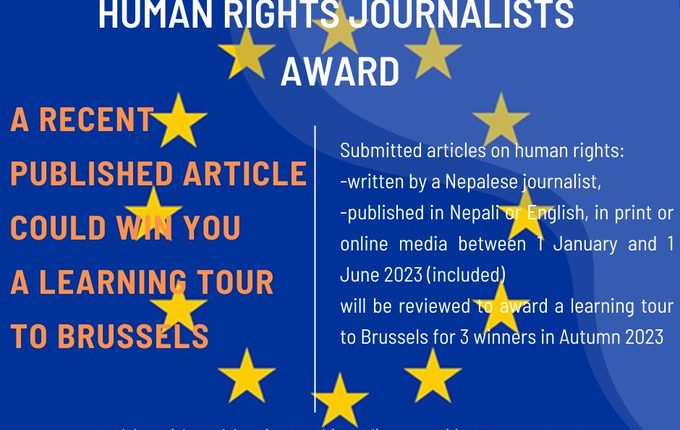The Delegation of the European Union to Nepal is launching The EU Human Rights Journalist Award to recognise excellence in reporting on human rights issues in Nepal. The main objective of the award is to recognise the contributions of Nepali journalists to raise awareness on the need to promote and protect human rights with the authorities and the general public.
The media play an important role in highlighting the challenges to defend human rights to ensure that all the human rights are well-protected in Nepal. We need to reach out to citizens and governments for meaningful action to defend human rights. Journalists can stimulate dialogue and action across borders by sharing information.
In this regard, the EU Human Rights Journalist Award aims to support Nepali journalists who are raising awareness about human rights and enhancing the understanding of the EU’s effort for protecting human rights.
The EU Delegation hopes that the Award will attract significant media interest in human rights and encourage high-quality human rights journalism in Nepal.
The selected journalists will then travel to Brussels, in order to find out more about the EU human rights policies and reporting, and discuss with Brussels-based media and the EU institutions. Upon their return to Nepal, they will be asked to publish news articles based on their experience in Brussels.
Eligibility
The Award is open to print and online professional journalists who are citizens of Nepal. For the purpose of the Award, professional journalists are deemed to be journalists working for officially recognised news outlets registered in Nepal.
How to Apply
Applicants should submit the following documents via email to [email protected]
- Application form, download the form here
- A copy of the applicant’s published article (in MS-Word or PDF format).
The submitted article must be the applicant’s original work and cover “human rights issues” in Nepal.
The deadline for submission is 26 June 2023, 6 pm. Incomplete or late applications will not be considered.
Entry Details
- Thematic scope
“Human Rights related issues” include but are not limited to human rights of the women, children, the elderly, persons belonging to marginalised or underprivileged communities such as Dalits, ethnic and sexual minorities. Human Right issues pertaining to freedom of expression, labour rights, or the impact of climate change on human rights can also be included.
- Period of Assessment
Articles submitted should have been published from 01 January 2023 – 01 June 2023
- Language
All submitted articles (one article per one journalist) should be written either in Nepali or in English.
- Length
Each entry should be no longer than five (5) pages in Nepali (font: 10pt., line spacing: 1.0, standard margin in MS-Word) or 2,000 words in English.
- Dates
- 26 May 2023: Launch of The EU Human Rights Journalist Award in Nepal
- 26 June 2023: Closing date of applications
- 26 July 2023: Announcement of the top 3 Awardees
- Autumn 2023: a one-week study visit to Europe
Judging Criteria
- The jury will consist of the EU Delegation to Nepal and one independent journalist.
- Entries will be evaluated based on their relevance for the thematic scope of the award and for current affairs, for their clear messaging, analytical element and originality.
Reward & Conditions
- The three (3) final winners will be contacted individually and the announcement will be placed on the EU Delegation’s website (https://www.eeas.europa.eu/delegations/nepal_en?s=237) by 26 July 2023.
- The winning journalists will participate in a one-week study visit to Europe in the autumn of 2023.
- During the study visit, the three winners will meet the key EU experts and institutions in the human rights field. Following the EU visit, each journalist will publish at least one (1) human rights related article with reference to the EU within four (4) weeks upon their return to Nepal.
- Copyright
The applicant/author grants to the European Union a non-commercial and royalty-free right to use – reprint full or in part; and distribute – the articles submitted as entries and those published as a result of the study visit. The author will be appropriately acknowledged when his/her article(s) is/are used.


Comments are closed.